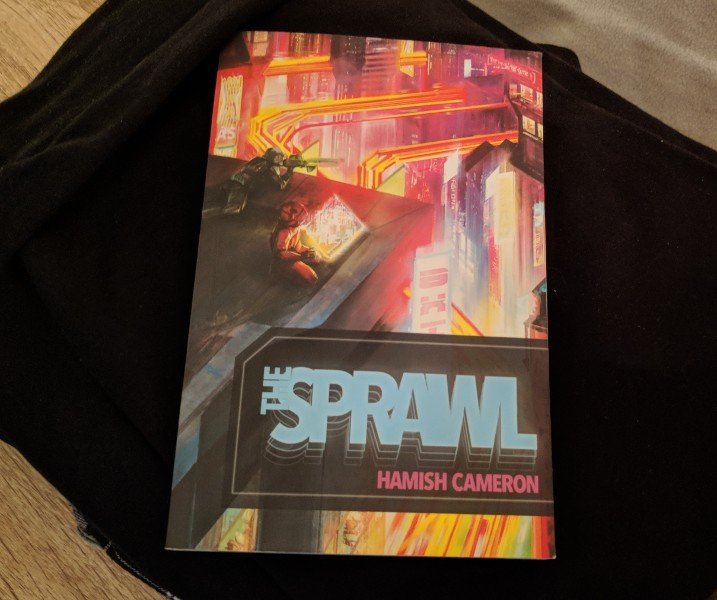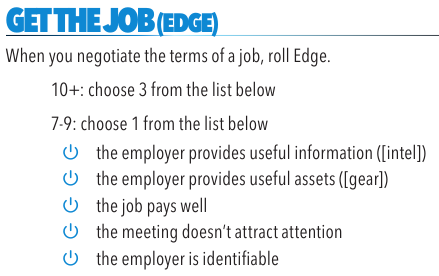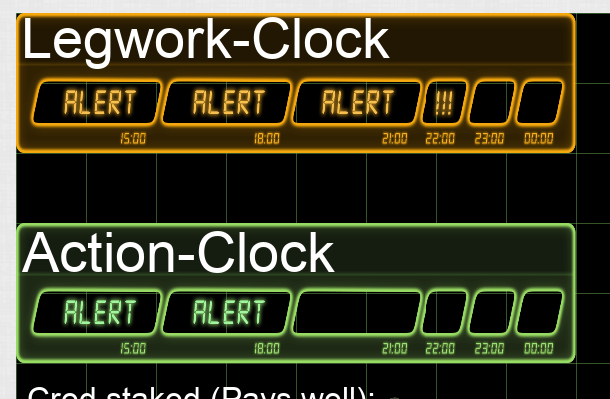Yesterday I had my first (gameplay-)session of The Sprawl, as a Game-Master.

Even though I feel very comfortable with Powered by the Apocalypse (PbtA) games, I am having a hard time with The Sprawl, and my players do, too.
I will not say too much about the mission I gave my players for now:
- The mission hasn't ended yet. If I spill secrets, and one of my players stumbles on this post, they would have knowledge they should not have.
- I will create a mission-based story-log/diary-thing. Somewhat for me, to not forget what happened (my notes only include crucial things like "X owes Y a favor!"), but also for you guys to read.
The mission was a very normal first mission for the players though:
- Get a call by the client.
- Meet the client in some shady place.
- Here's your job: Please steal a robot-prototype from corp X.
But here is where the trouble starts. This is a PbtA game, thus I'm playing to find out.
Rewind 3 days: I'm planning for an hour, what to do with the players. They couldn't tell me, because they did not have any interaction with the world before, so I had to prepare something:
- What? (Ended up being 5 lines)
- Where? (Also about 5 lines)
- This implied a: How? (Bad mistake planning this!)
- Complications?
- The team is a bunch of weirdos:
- Pusher – Talker with a vision, to destroy a Mega-Corp
- Fixer – Peoples-Person, running from a Mega-Corp
- Driver – Hunted by a machine cult
- Killer – Included in … Cyber-Greenpeace?
- One of these things is not like the other hums
- Inserting hooks, and making everything personal cost me another 12 lines.
- The team is a bunch of weirdos:
- The GM has to prepare 5 Mission-Directives, which dictate, at which point the players gain XP.
- An example: "When you deliver the prototype, mark XP."
- This by nature is very rigid, and actively opposes playing to find out.
- What if the players don't want to deliver to prototype? They're not getting paid, yeah … But they're not getting XP, either!
- The GM is also adviced to prepare states for the Action-Clock and the Legwork-Clock.
- These are basically 10 short sentences describing what happens if the players make X amount of noise.
- An example: "Action, 1800 - A guard in front of every department door."
- Again, very rigid. What if the players never go anyway near the department, and find another way?
- Should you ignore what you prepared, and make something fictionally appropriate up? Great job wasting my time with useless preparation.
- Or should you make it easy on them, negating all the tension which would be introduced by the clocks? This feels like I am making it too easy for the players.
All this preparation leads to another problem: What if the players say, they do not want to do the job, the GM gives them? Unless the GM planned 3 other missions, the session would be over. Not playing to find out, again!
Since this is a mission-based game, where you have to prepare stuff beforehand, you are playing hide-and-seek with information. Give the players enough information, but not too much.
There is a move, to be done, at the beginning of the mission: Get the job

This move encompasses all the discussion, banter, bartering, and so on, you would see in games like Shadowrun, when talking to Mr Johnson. It's all abstracted in a roll. Don't tell the players too much at the meeting.
Additionally there is a mandatory Legwork-Phase, meant for the players to get the information they need.
This very much shouts: Do not give the players too much information at the beginning. They will skip Legwork completely, if you do.
This gets very problematic, because it is easy to skip important information the players should have.
They will either figure them out immediately, by rolling well. That is only mildly interesting.
Or they will roll badly, and the Legwork and eventually Action-Clocks tick up.
This in turn is bad, because it means the players don't get information they need, and the mission only gets harder.
Advancing clocks means you are not telling the players what they did wrong, and where to go next. You are just telling them BAD! go, somewhere else! A recipe for disaster.

For now I will only tick the clocks if up fiction seriously demands it, or if the players pick a "Something attracts attention" drawback on a 7-9.
None of the problems I encountered are talked about in the book, sadly. I got some great feedback from my players though.
Next mission I prepare will include a basic, very risky plan to tell the players. Focusing more on the what, mostly ignoring the how.
The Legwork-Phase then should be used to defuse the plan. Let's see where this leads.
This is a good read. Like I mentioned in my own post, I really hate the pre-made content for this game. I never use things like the action clock, instead favoring other pressures. The campaign I am running now is filled with paranoia and my players are constantly expressing fear they are being followed or otherwise set up, especially at times when, from my point of view, nothing is really happening. I feel like this is a much better way to create tension in the game than some artificial counter.
I was concerned about something similar, so I devised my own system for Karma reward. Just because you didn't complete the job successfully does not mean you didn't learn anything from it. Having run and played this game for a few years now, I find that combat focused games get tedious fast, so it's better to encourage roleplay. With that in mind, I put a mark next to each player's name (in my GM journal) every time a player interacts with another in a scene. I may add an additional stroke for exceptional roleplay or particularly inventive problem solving. At the end of the mission (successful or not), I average them together to get base Karma. Once I have the average, I then use a few modifiers like subtracting for failed mission, or adding for particularly difficult encounters.
This system works really well for situations like our current one, where we needed to take a break from SR for a few weeks. It's better to settle Karma during the break and start fresh than try to remember where everything was at several weeks later.
This is a classic rookie GM mistake. I'll share my notes as part of my series on Shadowrun, but you'll see that I tend to make bullets about information I want the players to get from an investigation scenario.
It doesn't matter to me how they get there and I often find that they will give me ideas about where to take the story next. Keeping it more open really helps take some pressure off of me. I don't have to try to lead them here or there. I can just parcel out information as it feels appropriate for the task. I may allow rolls for grilling certain characters, but often an NPC they are talking to will just give them information that's pertinent to at least get them to the next plot point, because it advances the overall story.
A classic trap less experienced GMs fall into is being too rigid with the ruleset. If you give yourself permission to make adjustments, you'll probably end up a lot happier. The game is designed in many ways to be "take it or leave it". If you embrace that spirit, your frustration level will likely drop substantially.
The most important thing of all is to have fun. If your players are having fun and you're having fun, then you are running a good game. If you are not having fun, switch it up to make it more fun. If the rules are in the way of that, change them. It's your game.
The Sprawl (and quite a lot of the PBTA games, in fact) has a real problem with information control. You would think that, if you want to actually be able to make use of a lot of things like the timers and all of those mechanical pressures which drive players to activity that those players would need to know what the state of the timers and information that their characters don't necessarily know in order to actually feel pressure – but the advice and the architecture push the GM to hide all of the necessary information that would help him out.
Likewise, TS would get a lot of value in general from a Gumshoe-like success role for Legwork which goes, "okay, you found something out successfully – what is it?" And then things snowball from there with the player providing the detail. But that's not how it works, because you need all of the clocks running to provide the time pressure, and you need the details to set up the "what if they don't do this thing?"
Ultimately, it ends up a bit of a mess. Mainly because it can't decide what it wants to be, a player-powered narrative game or a GM-powered traditionally architected story flow game.
soundes interesting. Looking forward to read the mission log once it's up.
I would think that the rules should serve the plot and not the other way around. Not having experiance with this game it sounds very restrictive in what is allowed.
Things I do when running The Sprawl.
I write my Legwork and Action Clocks so that they are location agnostic or target the team directly. So it will say something like, "Any facility controlled by the corp has armed security posted." OR "Hugo The Butcher personally tracks down the PCs."
I word my mission Objectives in terms of key decisions. So I might say, "When the players decide what to do with the probe, mark XP"
I always assume the players can get paid, just maybe not by their original employer. So, if they go for a double cross you will still roll Get Paid even if that means you get approached by a mysterious stranger who thanks you for serving their interests and will be speaking again with them in the future.
This is because I treat all corps ultimately as omniscient gods. The PCs can't hide from everyone at all times and if I corp doesn't know what you're up to, it's only because they aren't looking. That's why you can write Legwork and Action clocks at all. It don't matter what the PCs do, when they attract attention they WILL find you.
To me, "mission based" and "play to find out" are not at odds. Just slightly constrained. Combined it reads like this, "play to find out how the players do the mission." You give them a mission. Now we play to find out how that goes down. That's The Sprawl.
Hope that was useful.
For missions only this is somewhat true. Never having run a The Sprawl campaign before I fell back into my bad DnD habits of over-preparing (shrugs off remorse about his 80 pages DnD campaign PDF) – especially preparing the How? was a bad mistake – If I know how I want the players to get the thing, I'm not playing to find out, am I?
I ran two one-shots before, where I obviously couldn't over-prepare, since I was going to learn the teams composition while playing – This actually went pretty good, thinking back. Maybe it was because of the type of mission, maybe it was because of minimal preparation. We may never know (probably latter).
For a campaign which isn't just unconnected mission after mission The Sprawl doesn't help you at all I find. The only thing that stays between missions are the Reporter-Clocks, Corp-Clocks, and the characters experience/gear.
There can't be much of a story development, if the players don't get a say, about what mission to do next, and the players can't even decline a mission the GM gives them (well they can, but then it's session over, as I mentioned).
There are some simple hacks around that, like asking your players at the end of each mission:
But it's a hack. The book doesn't include that.
My current intention is very much to run a campaign with meaningful player input for the missions, rather than nothing changing at all in between the missions, except some minor: "Hey, Corp X is at 2300 – Here's me showing you the barrel of the gun".
A few other things persist.
Contacts and how they feel about the PCs
Things that get turned into concrete Threats and become recurring problems.
The fictional state of PC's personal Directives and how those get developed.
Threats in particular are interesting because they build up over time and come and go. They make great unexpected twists.